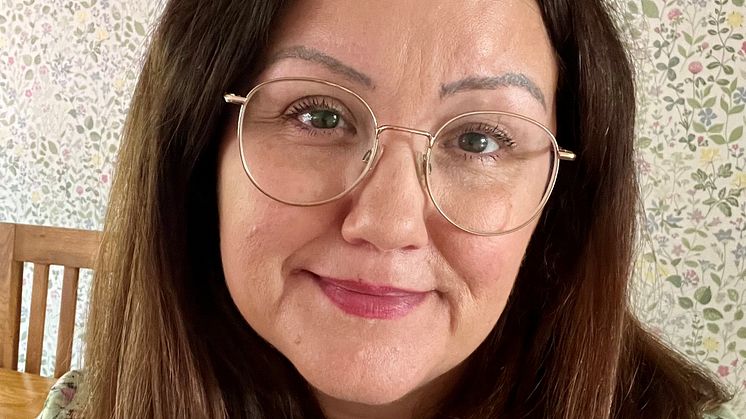
Pressmeddelande -
New survey shows that many people have difficulties opening medicine packages
Many people struggle with scissors and knives every day to open their medicine packs, while others give up and simply don't take their medicine. The Swedish Rheumatism Association has investigated the extent of the problems via a survey.
One of those who needs medication daily is Katarina Järvborn, who has lived with aggressive rheumatic disease (JIA) since she was 12 years old. Since she can't open her medicine packages herself, she must ask her family members to open them for her.
- ‘There have been times when I have injured myself trying to open medicine packages with my hands. I used to use my teeth to open them, but now I have a prosthetic jaw on the right side, which means I can't move my jaw like before,’ she says.
Katarina Järvbom has problems opening medicine packages.
She says that her children are now grown up, so she doesn't need to think childproof right now.
- ‘But in the past, when I had small children, I used a dosette box to take medicine myself, without having to have another adult present to open the packaging.
Some respondents to the Swedish Rheumatism Association's survey say that they leave an opened medicine package open, rather than reseal it. Others pour the contents into another pack/jar, jeopardising child safety. All this is done to avoid repeated problems once a pack has been opened.
An overwhelming majority (92%) of respondents say they sometimes have difficulty opening medicine packages. More than 20 per cent of respondents say they have problems with this every day.
- Even though the survey was aimed at people who may have difficulty with hand mobility, we find this figure remarkable. At the same time, this is a group that often needs medication every day,’ says Lotta Håkansson.
She points out that there are aids available, but that it can be difficult to find the right one.
- ‘It's not so easy, for example, for elderly people with weak hands to google around online and order blister openers or whatever it is they need. Many live alone and do not know where to turn for help. Of course, it is crucial that packaging is child resistant. But we also need to make sure that older people can open their medicine packs,’ she says.
For more information, please contact: Kristina Heilborn, The Swedish Rheumatism Association, Kristina.heilborn@reumatiker.se
Information about the survey
The Swedish Rheumatism Association has conducted an open member survey via mailings and via the Swedish Rheumatism Association's website. The survey has also been distributed by several other patient and pensioner organisations. The number of respondents was 2,245. The survey is not statistically reliable but should be seen as an indication of how the handling of pharmaceutical packaging may be perceived by the organisations' members.
Here are the questions we asked in our survey on the packaging of medicines and the results of the survey expressed as a percentage. We have also included some free text answers from respondents to the survey to highlight the problems faced by people who have difficulty opening their medicine packs.
Do you ever have problems opening medicine packages?
Yes 92 %
No 7 %
How often does it happen?
Every day 22 %
Once a week 31%
Once a month 27 %
More seldom 19 %
What do you do when you cannot open your medicine pack?
Ask family member for help 39%
Use tools available at home 38%
Use assistive devices 11%
Use your teeth 5%
Ask pharmacist for help 3%
Asking neighbours for help 1%.
What tools do you use?
Scissors 28 %
Knife 28 %
Pliers 21 %
Other 15 %
Screwdriver 4 %
Teeth 1 %
Once you have opened the pack, what do you do next?
Close it and hope to open it yourself next time 41%
Leave it open 31%
Pour the contents into another packaging/jar 26%
Have you ever not taken your medicine because you could not open the packaging?
Yes 14 %
No 85 %
The 14% who answered that they have not taken their medicine because they could not open the pack were asked the following question:
Has this resulted in a worsened state of health?
Yes 48 %
No 51 %
Have you been injured while trying to open a difficult-to-open medicine pack?
Yes 25 %
No 74 %
The 25% who said they had been injured while trying to open a pack were asked the following question:
Did you then need to seek medical attention for your injury?
Yes 1 %
No 99 %
The Swedish Rheumatism Association also asked which medicine packages respondents had the most problems opening, and these were the types of packages that most people said they had problems with:
- Child-resistant medicine jars that are opened by pushing and twisting the lid simultaneously
- Medicine jars with a ring of space as an internal protective barrier
- Blister packs
- Bottles and pipettes for eye drops
Quotes from respondents to the survey:
‘For me the problem lies in all blister packs. I have an ‘expander’ but it is still a pain and time consuming. Usually, the medicine is also available in a can, but then it is not included in the high-cost protection’.
‘I have problems with many packages and have been forced to switch to getting my medication in dose sachets’.
‘I have osteoarthritis in my fingers, and it hurts like hell to push out the tablets’.
Reumatikerförbundet är Sveriges största patientorganisation. Vi driver reumatikernas frågor i samhället genom att informera om de reumatiska sjukdomarna och dess konsekvenser samt påverka beslutsfattare på alla nivåer. Det kan gälla allt från tillgång till rehabilitering, kortare vårdköer till att skapa en arbetsmarknad som passar för reumatiker. Vi ger våra medlemmar stöd i vardagen. Genom förbundets föreningar över hela landet träffas personer med olika reumatiska sjukdomar, får information, byter erfarenheter, får tips och framför allt har roligt tillsammans. Vi är, näst efter staten, den största bidragsgivaren till forskning om de reumatiska sjukdomarna. Vårt mål är att skapa en samhällsutveckling som ger alla reumatiker full delaktighet och jämlikhet inom alla samhällsområden. Vår vision är ett bra liv för alla reumatiker och lösningen på reumatismens gåta.




